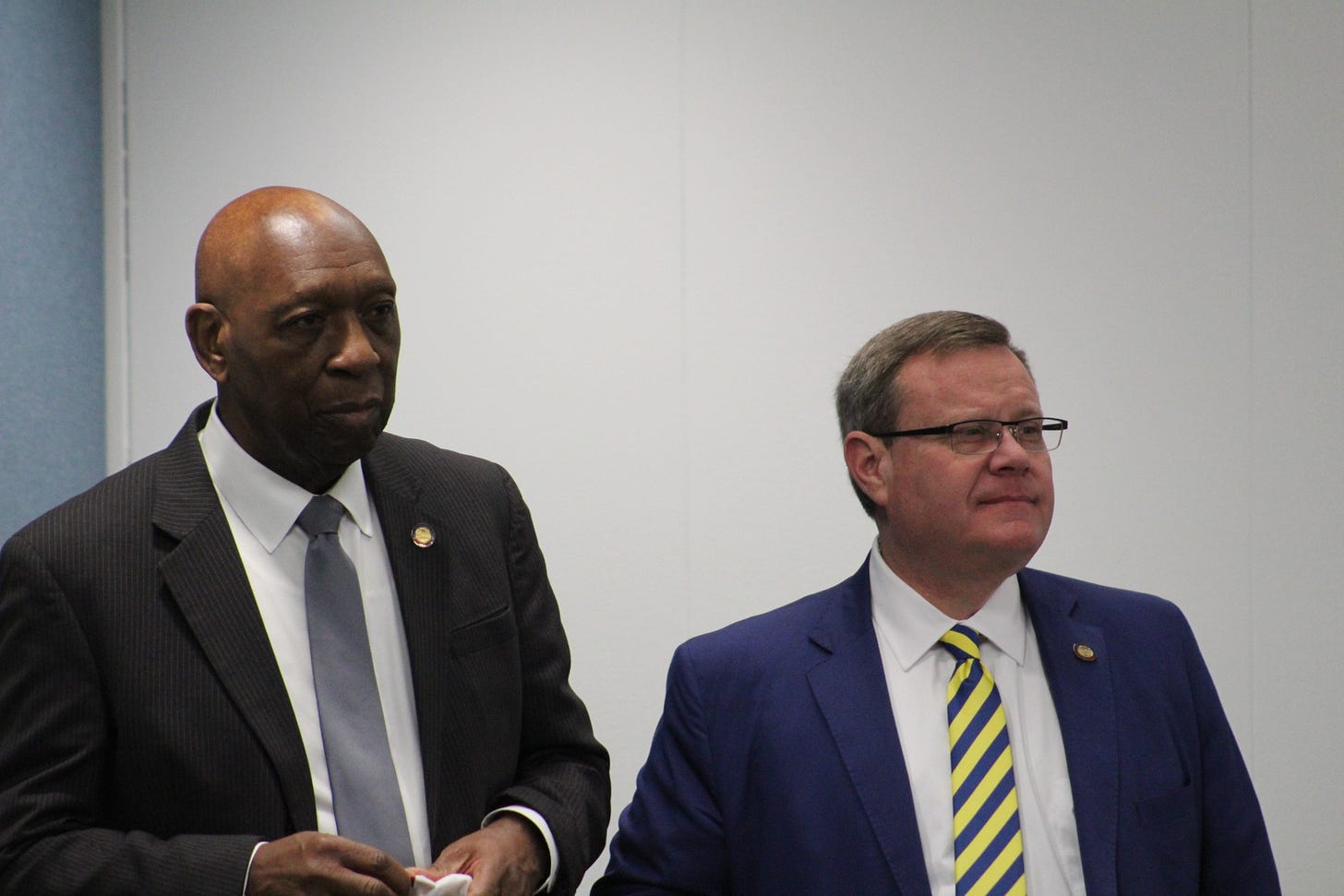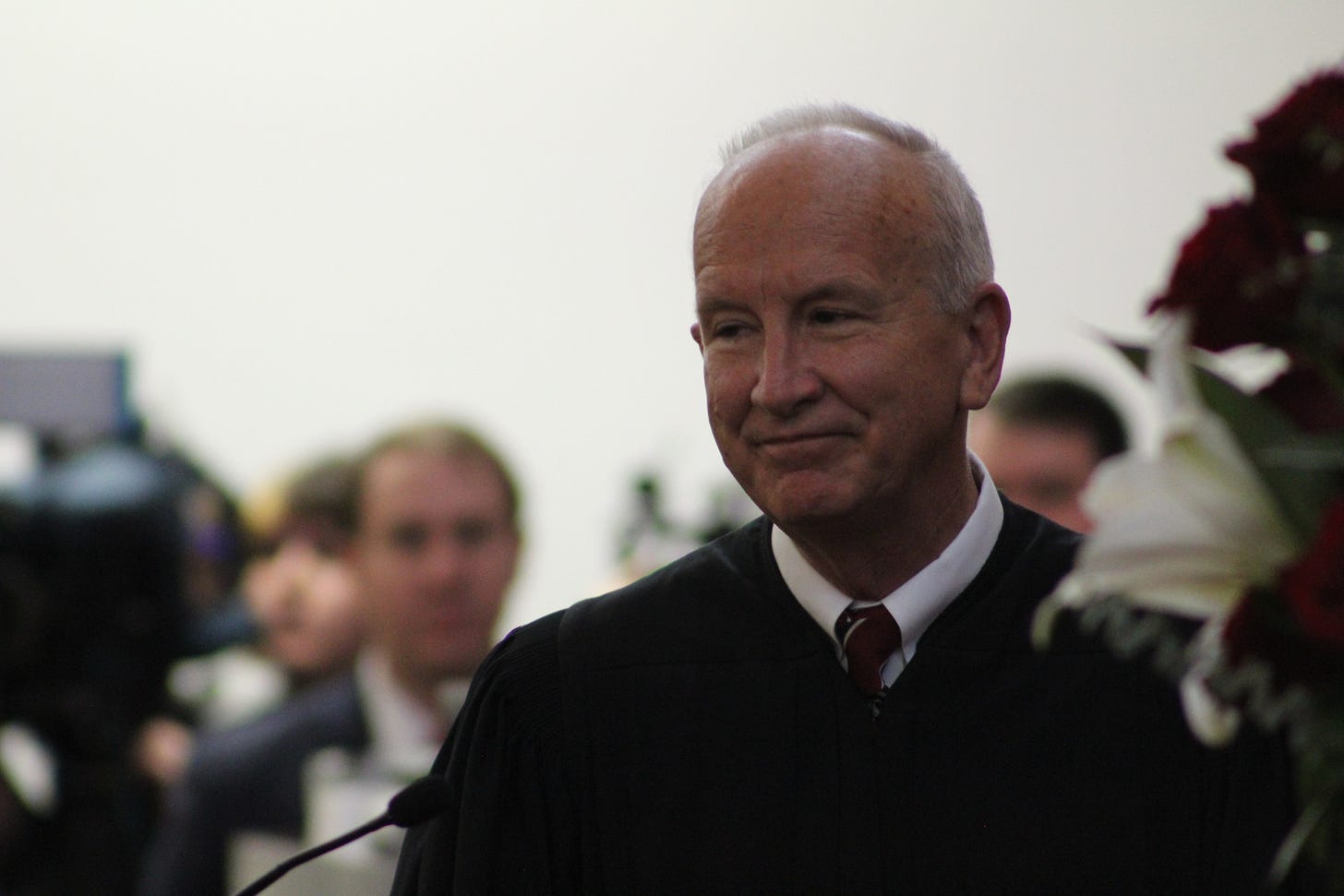Weekly Recap: Catch up on the news you missed from 3/12-3/18
North Carolina's Supreme Court reheard voter ID and redistricting cases, lawmakers sent a gun package to Gov. Roy Cooper, the Senate voted to expand Medicaid and Cooper's veto powers come into focus.
What an incredibly active week it’s been in North Carolina politics.
Gov. Roy Cooper allowed two bills to become law that were similar to measures he previously vetoed, the state Supreme Court appeared poised to side with Republicans on voter ID and redistricting cases, the state Senate passed Medicaid expansion and a $5 million fund has been proposed to help western North Carolinians affected by a forthcoming Canton mill closure.
Let’s recap what you need to know from the week that was:
✒️Cooper’s limited veto power comes into focus

On Thursday, I had a piece in The Assembly highlighting the history of vetoes in North Carolina. You can check out some of the key takeaways here. I also went on PBS NC’s “State Lines” program to discuss the major highlights.

North Carolina was the last state in the country without a gubernatorial veto. Despite efforts to change the state’s last-in-nation status by Republican Gov. Jim Martin, he fell short of the support he needed in the state House.
By 1989, Cooper (a House member at the time) was one of a handful of Democrats in his chamber to support giving the governor a veto. When Republicans took control of the House in 1995, Cooper (a state senator by that time), saw an opportunity to get a bill passed.
The result was a compromise Cooper negotiated between Republicans who wanted a strong veto and Democrats who didn’t want to cede any of the legislative powers they had enjoyed for decades. The final product gave the governor some of the most limited powers in the country. Unlike most states that have a two-thirds override threshold, North Carolina governors could have their vetoes overridden with a three-fifths vote.
The governor also couldn’t veto voting maps, local bills, constitutional amendments or General Assembly resolutions.
The three-fifths threshold has made it so now Governor Cooper can’t afford any defections within his party. If two House Democrats are absent during a voting session or one House Democrat crosses party lines on an override vote, Cooper’s vetoes may not be able to be sustained. Republicans already have veto-proof control in the Senate.
Since Democrats broke GOP supermajorities in 2019, all of Cooper’s vetoes have been sustained.
Chris Cooper, a Western Carolina University political scientist, noted that Gov. Cooper’s lack of a say in redistricting has also proven consequential.
“Past Roy Cooper tied current Roy Cooper’s hands behind his back,” the WCU political scientist said. “If he had written a different kind of veto, we’d have a very different North Carolina.”
Anti-rioting bill, hotel tenancy measure approved without Cooper’s signature

On Friday, Cooper announced he’d let a pair of bills become law without his signature. Under House Bill 40, people who engage in looting or violent protests would face harsher penalties.
The bill was put forward by Republican House Speaker Tim Moore in partnership with Democratic Rep. Shelly Willingham of Edgecombe County. It passed with some bipartisan support, but was largely opposed by Democrats who worried the bill would discourage people from exercising their First Amendment rights to free speech and assembly.
Starting Dec. 1, violent protesters could be held in jail for 24 hours before being allowed back onto the streets. Those who cause property damage of at least $2,500, could face felony charges punishable by up to 63 months in prison. Anybody who is personally injured or has their property damaged as a result of a riot may sue the person who caused the damage for three times the actual damages sustained, as well as court and attorney fees.
Cooper vetoed a similar measure in 2021 that had called for 48-hour holding period and $1,500 property damage threshold. In announcing he’d let this year’s bill become law without his signature, Cooper acknowledged the recent tweaks to the measure but reaffirmed his view that existing laws are sufficient.
“Property damage and violence are already illegal and my continuing concerns about the erosion of the First Amendment and the disparate impacts on communities of color will prevent me from signing this legislation,” Cooper wrote.
Six House Democrats voted for HB 40, and Willingham had vowed to override Cooper if he chose to veto the measure.
The governor on Friday also said he’d let become law a bill that would eliminate tenant rights for guests at hotels and other similar temporary lodgings during the first 90 days of their stay. The bill had passed with support from 15 House Democrats.
"This bill was given broad support in the legislature and there are potential positive modifications being discussed by legislators,” Cooper said in a statement on Friday. “However, safe housing is sometimes only available from temporary shelter such as hotels, and I remain concerned that this bill will legalize unfair treatment for those who need protection, and this will prevent me from signing it."
Senate Bill 53 will take immediate effect.
⚖️NC Supreme Court rehears voter ID, redistricting cases

On Tuesday and Wednesday, North Carolina’s Supreme Court reheard cases that stand to impact who voters can elect and what may be required of them in order to cast a ballot.
The state Supreme Court’s former 4-3 liberal majority court in December ruled that partisan gerrymandering violated the state constitution and that a 2018 state law compelling residents to show proof of ID in order to vote had the effect of unlawfully discriminating against racial minorities.
Just 49 days after the prior court’s ruling, the new 5-2 conservative majority court agreed to rehear the cases. On Tuesday, the court reheard the redistricting case. You can get a comprehensive recap of what took place here. Essentially, the Democratic justices insisted the court had a role in overseeing maps, while the Republican justices showed greater deference to the Republican-controlled legislature’s mapmaking powers.
On Wednesday, the North Carolina Supreme Court reheard a case that could pave the way for photo ID to be required in the 2024 election, though there are separate appeals tied up in federal and state court.
In November 2018, North Carolina voters approved a ballot measure requiring residents to show proof of identification at the polls in order to vote. But in the same election, voters elected Democrats that would break Republicans’ legislative supermajorities.
Before Democrats were to take office the following year, GOP lawmakers passed a bill to require voters to present an ID at the polls in order to vote. With strong conservative majorities now in place on the state Supreme Court and U.S. Supreme Court, it appears North Carolina may very well implement a photo ID voting requirement in the future. But when that’ll happen appears to be an open question. Lawmakers could also try to pass a new bill, hoping that courts will now rule in their favor.
The Republican justices in the NC Supreme Court appeared poised to rule in favor of the GOP lawmakers seeking to have the 2018 law upheld.
🔫Gun package goes to Cooper
North Carolina’s House on Wednesday sent Cooper a bundled gun bill that seeks to accomplish three things: Repeal the state law that compels prospective pistol owners to get a permit from their local sheriff before they can own the firearm, allow for concealed handguns in churches located on school property and create a statewide safe storage public awareness campaign.
Cooper has until Saturday night to sign it, veto it or let it become law without his signature.
Democrats largely oppose the pistol permit repeal and concealed handguns in churches, but support the public awareness campaign. In the end, three House Democrats voted for the 3-for-1 bundled bill, of which two are seen as likeliest to override Cooper: Willingham and state Rep. Michael Wray of Northampton County.
Willingham told me last month he would likely oppose the gun package because it included the pistol permit repeal, but he reversed course. Wray was an original sponsor of a standalone pistol permit repeal bill but ultimately voted against it. By putting the pistol permit repeal in a larger package, Moore was able to secure Wray’s support.
Cooper vetoed similar efforts to loosen gun laws in 2021 and is seen as likely to veto such efforts again, though he could choose to let it become law if he views an override as inevitable.
The governor has maintained lawmakers should instead focus on combatting gun violence. On Tuesday, Cooper signed an executive order to create a statewide Office of Violence Prevention housed within the Department of Public Safety to focus on finding ways to reduce gun deaths.
House Deputy Democratic Leader Ashton Clemmons of Guilford County said she’d work to sustain a possible veto from Cooper on the legislation loosening gun laws.
“We will certainly work to prevent any legislation that makes NC less safe from becoming law,” Clemmons said.
🏥Senate votes to expand Medicaid
With little debate and near universal support, the North Carolina Senate on Wednesday voted to expand Medicaid, sending a compromise bill over to the House.
The House is expected to take up the legislation this week. It has Cooper’s support, but the bill’s implementation is contingent on a budget being enacted and the federal government covering at least 90% of the cost of Medicaid recipients.
House Bill 76 stands to expand access to Medicaid for 600,000 residents who currently earn too much to qualify for conventional Medicaid.
To address an anticipated demand within health systems, the bill would eliminate a handful of certificate of need laws in some of the state’s most populous counties. But the bill doesn’t go as far as Democrats and Senate Republican leaders had hoped.
Cooper has long advocated for Medicaid expansion. In 2019, he vetoed a state budget because it failed to expand Medicaid and didn’t include a number of other policy priorities of his administration.
Less than four years later, lawmakers appear on track to deliver on Cooper’s signature policy objective.
Cooper proposes final budget, with extra help for those affected by Canton mill closure

Cooper released a budget plan on Wednesday, calling for sizable spending increases that Republicans oppose.
Cooper’s budget calls for an 18% average pay raise over the next two years for K-12 teachers and $1,000 to $1,500 retention bonuses. The raises are aimed to help fill the 5,000 teacher vacancies.
Cooper’s office declined to make available the governor’s proposal ahead of a news conference. At the press availability, Cooper took few questions. As he left the podium, I had asked for his thoughts on the more than 1,000 residents of western North Carolina who stand to lose their job as the Pactiv Evergreen mill closes.
He returned to the podium, noting that his budget would create a $5 million fund to those affected by the Canton mill closure. He said he has spoken with Canton Mayor Zeb Smathers and western North Carolina U.S. Rep. Chuck Edwards.
“You will see a fund in this budget for people in Canton,” Cooper said. “We put an initial $5 million in there, but we've also structured it so that it can accept federal funds, private funds, additional funds that the legislature might put in place. And we are talking with the people there and working in a coordinated effort. I talked Congressman Edwards the other day, spoken to the mayor in Canton [and] we understand that this is a big blow to the people in western North Carolina across the board. We've got to work to fix it.”
On Thursday, Cooper sent a letter to Pactiv Evergreen CEO Mike King, warning that the state would seek to compel the company to return $12 million to the state if the mill closed. Cooper cited a 2015 agreement in which the company vowed to keep the mill open through 2024 and retain at least 800 full-time employees.
“If you follow through your announced plans, we will demand full repayment of those funds,” Cooper wrote.
Cooper’s office didn’t respond to my questions about whether the governor would like to see any state or federal investigations into four company executives who sold stock days before the Canton mill closure announcement.
Since the March 2 stock sales, the company’s value has been cut by nearly one-third, with the stock price dropping from $11.30 per share to $7.65 by the close of Friday’s regular trading session, a difference of 32.3%. The stock sales have allowed the executives to avoid what is now more than $214,000 in stock losses.
Edwards has called for the Securities and Exchange Commission to investigate the stock sales.
Cracking down on infrastructure attacks
In December, two electrical substations in Moore County were attacked, leaving more than 40,000 residents and business owners without power.
Under Senate Bill 58, which passed the Senate on Tuesday and is now in the House, people who damage an energy facility would face a $250,000 fine and be charged with a felony punishable by a prison sentence between 58 and 92 months. If the attack results in the death of another individual, the offender would be sentenced to anywhere from 94 to 393 months in prison.
🏫Anti-CRT effort advances
A measure that would limit how racism and other concepts are taught in K-12 schools cleared its first committee vote on Tuesday.
The bill doesn’t explicitly name “critical race theory,” a scholarly framework for thinking about America’s history through the lens of racism. Academic researchers developed it during the 1970s and 1980s in response to what they viewed as a lack of racial progress following the civil rights legislation of the 1960s.
Conservatives have since used CRT as somewhat of a catch-all phrase to describe K-12 classroom activities and materials they find objectionable.
Under House Bill 187, K-12 public school teachers would be prohibited from promoting the view that the United States was created by members of a particular race or sex for the purpose of oppressing members of another race or sex. It would also prevent educators from encouraging students to believe they should feel guilty because of their race or sex.
Teachers could still introduce such concepts, but would need to make clear to students that the school isn’t endorsing the views. Democrats fear the bill would prompt teachers not to discuss racism at all or introduce any materials that could be seen as divisive.
🎓No college degree? No problem
Cooper on Monday signed an executive order directing state agencies to place less emphasis on college degree requirements in hiring practices.
The move comes as the state struggles to fill more than 16,000 state worker vacancies.
Under Cooper’s order, the state Office of State Human Resources must add a line on job postings that relevant work experience can serve as a substitute to a college degree for most state jobs.
About 75% of state job classifications either don't require a college degree or allow experience to be substituted for education, according to Cooper’s office.
🏀🏈⚾️Online sports betting bill unveiled⚽️🎾🏒
On Monday, North Carolina lawmakers introduced a bill to legalize mobile sports betting.
Under House Bill 347, it would be legal to wager on professional sports, college sports and Olympic events. The bill would allow a commission to approve 10-12 licenses to prospective operators seeking to accept sports wagers.
A similar effort to legalize sports gambling on mobile and electronic devices narrowly failed in the House last year. Cooper hopes to sign such a gambling law this session.
In 2019, Cooper signed a law that allowed Indian tribes to add sports and horse race wagers to their list of offered games. Today, Catawba Two Kings Casino Resort in Kings Mountain, NC, Harrah's Cherokee Casino Resort in Cherokee, NC and Harrah's Cherokee Valley River Hotel & Casino in Murphy are the only legal sports betting sites in the state.
What to watch this week
MONDAY: The U.S. Supreme Court deadline for parties in an important North Carolina redistricting case to submit briefs about how the NC Supreme Court’s decision to rehear a case impact the ongoing U.S. Supreme Court case. GOP lawmakers are seeking to argue to the U.S. Supreme Court that they ought to have sole mapmaking powers. Democrats and voting access groups are adamant that state courts ought to have oversight over voting maps.
WEDNESDAY/THURSDAY: House is planning to hold votes. I’ll be watching for Medicaid expansion to go to the governor, in addition to a number of other bills.
FRIDAY: Cooper tends to act on controversial bills on Friday. We should find out on Friday afternoon whether Cooper will veto the gun package or let it become law without his signature. If he vetoes it, he could be overridden for the first time since Democrats broke GOP supermajorities in 2019.
Tweet of the Week

📖5 essential reads
Cooper’s Veto Predicament (Bryan Anderson // The Assembly)
N. Carolina governor’s big budget increase scoffed at by GOP (Gary Robertson (The Associated Press)
Gov. Cooper to Pactiv Evergreen: Mill closure would be 'clear breach' of $12M agreement (David Plunkett // WLOS)
Residents’ frustration grows at slow progress to address PFAS pollution in their water (Will Atwater // NC Health News)
New NC Supreme Court could restore 2018 voter ID law (Carolina Journal)
Thank you for subscribing to Anderson Alerts! If you like these alerts, please tell your friends and consider upgrading to a paid membership to access all mid-week alerts.




